‘Football is personal for me,’ says Sundowns’ coach Mokwena
Sundowns’ coach, one of Africa’s best football technicians, hopes they will go far with his unique training approach.
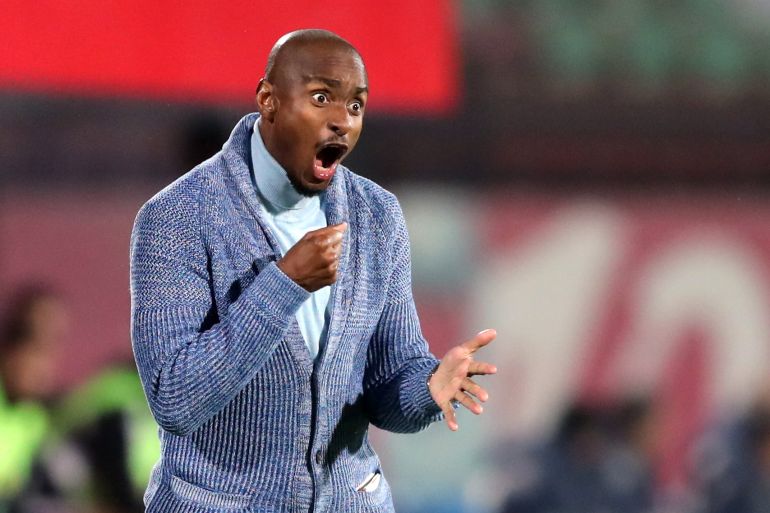
South African football clubs have only won a pair of African Champions League titles. In advance of Saturday’s semifinal, Mamelodi Sundowns’ coach Rulani Mokwena remembers both of them.
The Orlando Pirates took the trophy in 1995, a few years into the post-apartheid era, as ostracised South African clubs were admitted into continental competitions.
Keep reading
list of 4 itemsGundogan brace against Leeds takes Man City four points clear
Urawa beat Al Hilal to win third Asian Champions League
Messi apologises to PSG for unapproved Saudi Arabia trip
Although Mokwena was eight years old, he vividly recalled the club’s trophy parade passing through the historic township of Orlando West and making a stop in front of his house to honour his late paternal grandfather, Eric Sono.
Sono was an emblematic captain of the club who ignored laws prohibiting people of different races from competing with one another. He was also the father of Jomo Sono, Mokwena’s uncle, and one of the most influential personalities in South African football.
The next time a South African club won the Champions League was in 2016, when Mamelodi Sundowns defeated Egyptian heavyweights, Zamalek.
Mokwena, then 29, was on the touchline as an assistant to Pitso Mosimane. At the full-time whistle, memories of his grandfather washed over him and he was overcome with emotion.
“Football is personal for me,” he told Al Jazeera. “My grandfather achieved incredible things, my father played professionally, and my uncle played with Pele and [Franz] Beckenbauer in America and then coached in a World Cup.
“The expectation and the pressure that I live under and with every single day is that I have to work twice as hard to make sure I continue the legacy of my family.”
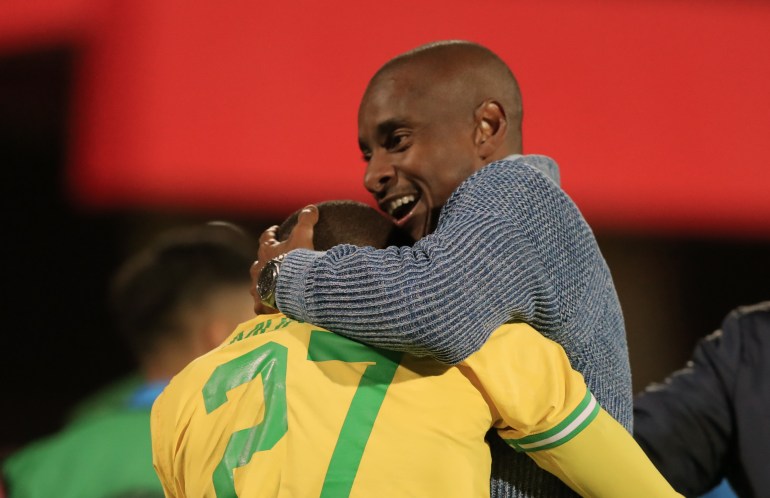
That kind of pressure can be a heavy load to bear, but Mokwena is no ordinary man. At the age of 36, and in his first full year as a head coach of a club, he has already cemented his reputation as one of the best tacticians in African football.
Coach Milutin Sredojevic, who worked alongside him during his stint as an assistant manager at Orlando Pirates, told Al Jazeera, “I never saw anyone work on the minute details of the game as much as Rulani.”
Mark Gleeson, one of Africa’s foremost football analysts, told Al Jazeera, “I think he spends 25 out of 24 hours working on the game. He’s a young coach that is completely obsessed with the game, does an incredible amount of homework and always has a plan.”
Mamelodi Sundowns had significant success before his arrival, and will probably continue to do so after his eventual departure.
The Pretoria club is bankrolled by the Motsepe family, who are one of South Africa’s wealthiest, and the club has no shortage of resources. But, the manner in which the club have played this season is a testament to their coach’s brilliance.
Watching a Sundowns match is not too dissimilar to watching Pep Guardiola’s Manchester City play in the Premier League.
Mokwena’s side play with inverted full-backs to add additional passing lines, they overload different sides of the pitch based on their opponent’s weaknesses, and implement sophisticated pressing and counter-pressing schemes to stifle the opposition in their own territory.
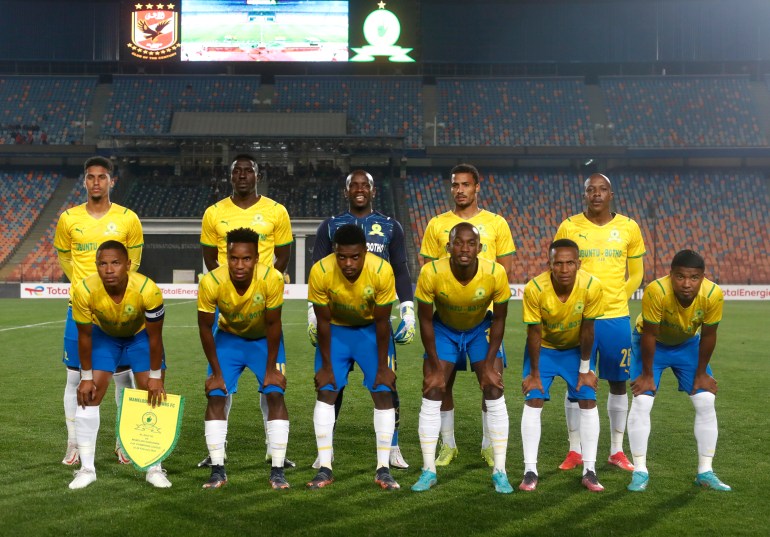
Masandawana won the league with seven matches to play this season. After 29 matches, they managed to rack up 21 wins, six draws and only two losses. Should they win their final match of the year against last-placed Maritzburg United, they will set records for total wins, total points in a season and depending on the scoreline, total goals scored.
Yet, Mokwena told Al Jazeera that he’s most proud of the collective effort his team invested in keeping a staggering 19 clean sheets this year, conceding a paltry 12 goals to boot.
“For me, it goes against the grain, or the footballing myth, that good defensive teams are teams that have low blocs, sit around the box and are very good on the counterattack. My belief is that the more control you have from a possession stance, the better defensively you are,” he explained.
Arsenal manager Mikel Arteta once famously called Pep Guardiola, “The most defensive coach I ever worked with in my life,” referring to Guardiola’s insistence on monopolising possession and controlling every aspect of the match.
Mokwena smiled and acknowledged that he belongs to the same school of thought. He understood, however, that in premier competitions such as the African Champions League, the outcome of a match does not always hinge on predetermined game plans.
“That’s what makes football so interesting. It’s a game that has so many variables or intangibles that are not just peripheral — they’re central. Because I know that I cannot control all of those variables, I don’t get frustrated by them,” he said.
Perhaps the most illustrative example of intangibles affecting results looms on the horizon for Mokwena, when Sundowns play the first leg of their semifinal in the African Champions League against defending champions Wydad Athletic Club of Casablanca this weekend.
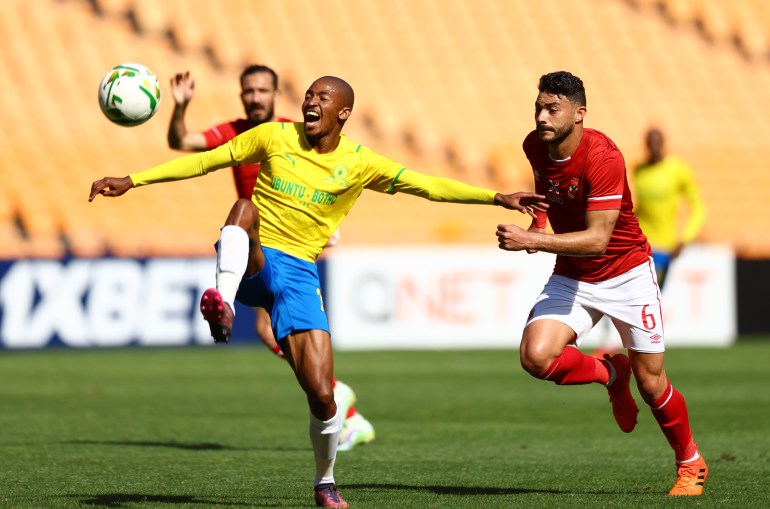
In addition to having one of Africa’s most talented squads, Wydad supporters generate, perhaps, the continent’s most intimidating atmosphere, which can petrify visitors, motivate hosts and impress referees.
To prepare his players for what will unfold at the Mohamed V stadium in Casablanca, Mokwena organised a particular set of psychologically oriented training sessions this week.
“I can’t exactly simulate the atmosphere from the supporters,” he admitted. “But one thing I can do is try to prepare the brain to emotionally and cognitively deal with stress hormones as best as possible.
“We made training as difficult as possible so that the game can be easier. In our exercises, I changed field sizes, game rules and tried to create different obscure shapes where cognitive stress and hormones would be released by the body.”
It is such innovative training sessions coupled with the close relationship he shares with his players and his brand of tactical football that has made Mokwena a star.
“His future is very bright. He is very much ahead of his time in South Africa and across the rest of Africa, too. He’s smart, I don’t detect much of an ego, and I think he will break a few barriers,” Gleeson said.
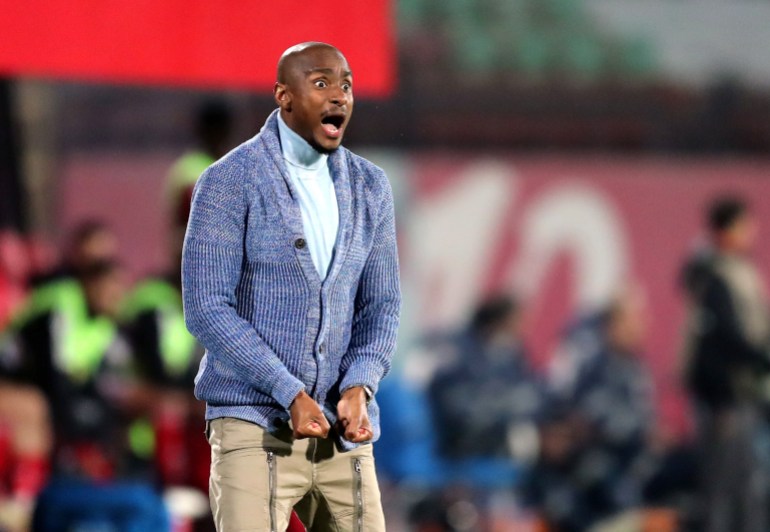
No African international coach has coached in one of Europe’s top five leagues. Johannesburg native Mokwena has set his sights high.
“It would be difficult to break through,” he admitted. “It would require a lot of scars and bruises to take the road less travelled, but I think as a medium to long-term focus, I would prepare myself for something like that, and I honestly believe it’s possible.”
That journey could begin with that elusive third Champions League title the South African public has been clamouring for over the last seven years.